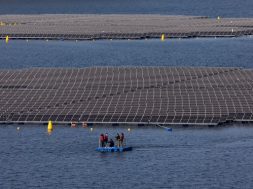
Korea Far Behind World Average in Renewable Energy
SEJONG : South Korea was found to have fallen far short of the world average in renewable energy use, amid a global ramp-up in efforts to attain carbon neutrality by 2050.
The world economies’ average in the percentage of renewable energy of the total energy supply reached 13.51 percent, according to the Organization for Economic Cooperation Development that cited the latest available data (for 2019 or 2018) from the Extended World Energy Balances. South Korea’s portion stood at 2.36 percent in 2019.
Headquarters of the Organization for Economic Cooperation and Development in Paris (OECD).
The OECD defines renewable energy as the contribution of renewables to total primary energy supply. It includes the primary energy equivalent of hydro, geothermal, solar, wind, tide and wave sources.
Energy derived from solid biofuels, biogasoline, biodiesels, other liquid biofuels, biogases and the renewable fraction of municipal waste are also included.
The figure held by Korea was also significantly lower than those of major Asian economies: 30.79 percent in the Philippines, 25.69 percent in Indonesia, 23.26 percent in Bangladesh, 22.59 percent in India, 9.24 percent in China, 6.24 percent in Japan and 3.41 percent in Malaysia.
The data puts Korea at the bottom among OECD members. The average of the 37 OECD members and the average of European countries in the OECD came to 10.91 percent and 15.95 percent, respectively.
High rankers in the French-based organization included Iceland with 90.13 percent, Norway with 54.58 percent, Latvia with 41.37 percent, Sweden with 40.78 percent, Denmark with 36.93 percent, Colombia with 26.02 percent, Chile with 24.27 percent, Portugal with 23.16 percent and Lithuania with 20.36 percent.
Among next on the list were Italy (18.23 percent), Germany (14.63 percent), Greece (12.82 percent), France (10.68 percent), Mexico (8.85 percent) and the Netherlands (7.17 percent).
Among the English-speaking countries in the OECD, 41.84 percent was seen in New Zealand, 16.37 percent in Canada, 12.49 percent in the UK, 7.91 percent in the US and 7.1 percent in Australia.
Experts at home and abroad say that Korea has to make full-fledged actions to achieve the goal of reducing greenhouse emissions by 37 percent by 2030. Some overseas reports pointed out that Korea’s performance in the environment sector had stayed at a meager level.
Korea hosted the 2021 P4G Seoul Summit last month. P4G — Partnering for Green Growth and the Global Goals 2030 — is a global initiative launched in 2017 to accelerate the response to climate change and the implementation of the United Nations’ sustainable development goals.
Twelve countries, including South Korea, took part in the gathering in Seoul.
A government official of Korea stressed that environmental problems and its consequences could eventually become a matter of survival for countries.
He said “natural disasters such as floods, droughts and typhoons in the aftermath of an abnormal climate have caused critical food shortages in many locations around the world.”
During one session of the summit, some participants suggested the world innovate farming techniques for food crop production or change its livestock rearing methods.
One method could be “expanding renewable energy” to replace current fossil fuels in crop production and adjusting animal feed to reduce methane gas emissions from livestock.
Meanwhile, a project by the Korea Water Resources Corp., also known as K-water, is drawing increasing attention for being able to provide renewable energy to both the industrial and residential sector, while simultaneously reducing pollutants emitted from the complex in Gyeonggi Province’s Siheung and Ansan.
K-water has established a plant to co-recycle obsolete activated carbon in the complex that is dubbed the Environment Energy Center.



















